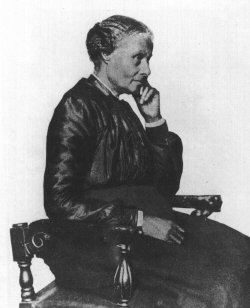Mary Ellen Pleasant, an African American entrepreneur and abolitionist, is renowned for her efforts in the Underground Railroad and her support of the abolitionist movement. She used her considerable resources to assist enslaved people who had escaped.
Born into slavery in Georgia in approximately 1812, Pleasant’s early years remain somewhat shrouded in mystery, with some sources suggesting her birth may have occurred in Virginia or Philadelphia. Raised in Nantucket, Massachusetts, by an abolitionist family, she worked as a bondservant for the Hussey family, known for their staunch anti-slavery stance.
In the 1850s, Pleasant moved to San Francisco after the death of her first husband. During the California Gold Rush, she initially worked as a cook and housekeeper. She soon began investing in businesses and real estate, establishing laundries, boarding houses, and restaurants, eventually becoming one of the wealthiest women in San Francisco.
Pleasant’s contributions to the abolitionist movement are profound. She is reputed to have financially supported John Brown’s raid on Harpers Ferry and used her wealth to aid the Underground Railroad, helping enslaved people escape to freedom.
One of Pleasant’s most significant legal confrontations occurred in 1866 when she sued the North Beach and Mission Railroad Company after being denied service on a streetcar due to her race. Though the California Supreme Court eventually overturned the case, it underscored the absence of legal segregation in California’s public transportation and set a precedent for future civil rights challenges.
Despite her extensive contributions to civil rights and successful business ventures, Pleasant’s later years were marred by legal battles and public scandal, reflecting the societal prejudices of her time. She faced intense public scrutiny and legal troubles.
Pleasant and Bell shared a mansion on Octavia Street in San Francisco, often called the “Pleasant-Bell Mansion.” This arrangement led to much speculation and rumors about the nature of their relationship. Some accounts suggest that Pleasant played a significant role in managing Bell’s financial affairs, and she was considered a trusted advisor and confidant.
After Bell’s death, which was officially ruled an accident, rumors circulated accusing Pleasant of murder and manipulation through alleged voodoo practices. These accusations were deeply rooted in racial and gender biases, aiming to undermine her influence and achievements.
Another high-profile legal entanglement involved the divorce case of former Senator William Sharon. Pleasant supported Sarah Althea Hill, who claimed to be Sharon’s wife and sought alimony. During these proceedings, Pleasant was again accused of using voodoo to manipulate Hill and others involved, further damaging her public image and financial standing.
While her connection to John Brown remains a topic of historical debate, Pleasant’s influence and efforts in the abolitionist movement are undeniable. Despite the controversies and accusations she faced, Mary Ellen Pleasant’s legacy is a testament to her resilience and unwavering commitment to justice.
Faced with financial difficulties, Pleasant filed for bankruptcy in 1899 and spent her final years in relative poverty, passing away in 1904.
Pleasant’s legacy is complex; she was celebrated and vilified in her time. Today, she is recognized for her significant contributions to civil rights and pioneering role as a Black female entrepreneur. Her life’s work, deeply entwined with the abolitionist movement, saw her cross paths with numerous vital figures of the era, like David Ruggles, an African American abolitionist and journalist, William C. Nell in Boston, and Thomas Starr King in San Francisco.
References: coloredconventions.org civilrightsteaching.org blackpast.org nationalwomenshistoricalsociety.org
Delilah L. Beasley, The Negro Trail Blazers of California. 1919. Reprinted by New York: G.K. Hall, 1968.
Hudson, Lynn M. The Making of “Mammy Pleasant”: A Black Entrepreneur in Nineteenth-Century San Francisco. University of Illinois Press, 2003.
